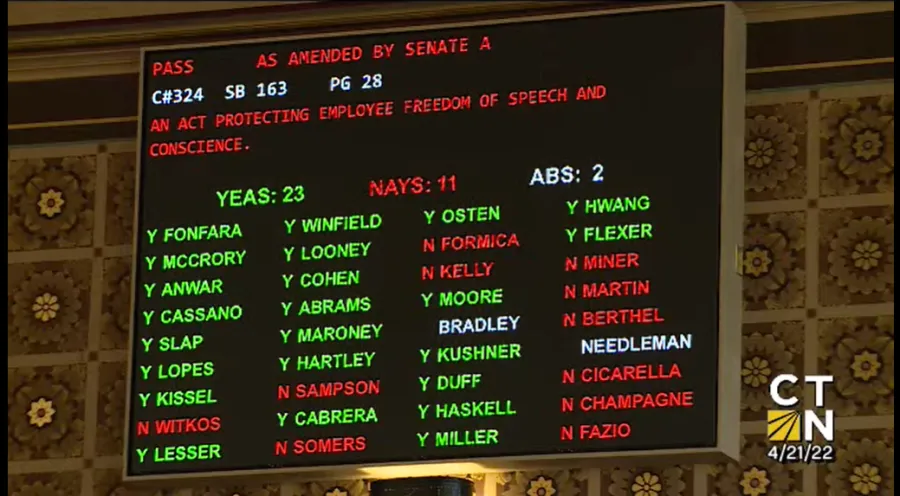Senate Gives Bipartisan Support to Legislation that Protects Workers from Captive Audience Meetings

HARTFORD – The Connecticut State Senate gave bipartisan approval on Thursday to legislation that would give workers the right to leave captive audience meetings and return to work when the subject of the meeting is about the employers’ position on politics, religion, or union organizing.
Captive audience meetings are mandatory meetings held during work hours to pressure employees to support political candidates or vote against forming a union. They are held in the vast majority of union organizing campaigns and management frequently threatens workers in these meetings.
“Today, the Connecticut State Senate took an important bipartisan step forward to protect workers from employer intimidation and harassment during union organizing campaigns,” said Ed Hawthorne, President of the Connecticut AFL-CIO, which represents over 200,000 union members across the state. “Far too often, management forces workers to attend closed-door captive audience meetings where they frequently threaten business closures, wage cuts, layoffs, immigration status, and working conditions if workers vote for a union.”
Workers from a variety of fields testified before the Judiciary Committee in early March about their personal experiences with captive audience meetings.
John Brady, a former Registered Nurse at Backus Hospital, explained how coercive these meetings are for workers.
“You know, captive audience meetings are well named,” said Brady. “You’re captive.”
When Brady was helping organize his union at Backus, management forced healthcare workers into one-on-one meetings.
“We stepped into a supply closet,” explained Brady. “The door closed behind and they stood with their back to the door… There was no other way out.”
An employee who refuses to attend a captive audience meeting is currently at risk of being terminated. Even speaking up during these meetings puts the worker at risk of being disciplined.
Workers at McDonald’s at rest stops on I-95 have been forced to attend captive audience meetings since 2019. Their employer even illegally fired union supporters (although an administrative law judge recently ordered them rehired).
Testimony during the public hearing highlighted workers recently being forced to attend captive audience meetings, including workers at Glanbia Nutritionals in West Haven and Orange, nurses at Apple Rehab in Waterbury, bus drivers in Newington, environmental service workers at Foxwoods, and service workers at the Stamford Hilton.
“No employer should be able to force a worker to attend a meeting to coerce their opinions on religion, politics, or union organizing,” said Hawthorne.
Opponents of the legislation argued the proposal would be pre-empted by federal law.
However, Attorney General William Tong issued an opinion in 2019 that the captive audience proposal is not preempted under the National Labor Relations Act. The current proposal is substantially identical to the proposal in 2019.
“Workers should not be forced to listen to their employer’s religious or political views—including anti-union rhetoric,” said Attorney General Tong. “The Office of the Attorney General has carefully reviewed this legislation and stands ready to defend the statute against any challenge.”
Connecticut would be the second state in the nation to pass legislation protecting workers from being forced to attend these meetings.
“Countless workers across America are forced by their employers under the threat of discipline to attend captive audience meetings every single day,” said Liz Shuler, President of the national AFL-CIO. “This coercive tactic has been legal for far too long. The AFL-CIO thanks the Connecticut state Senate for its passage of Senate Bill 163. This bill is a crucial step forward to protect Connecticut’s workers from employer interference with their religious and political freedom and right to freedom of association. Now it’s time for the Connecticut House of Representatives to stand with workers and do the same.”
Judiciary Committee Co-Chair Gary Winfield lead the debate in support of the bill with support from fellow Democrats and Sen. John Kissel, the Ranking Member of the Judiciary Committee.
“The labor movement is incredibly thankful to the senators who voted for this critical pro-worker legislation,” said Hawthorne. “We are especially thankful to Sen. Gary Winfield for his steadfast support of this bill and ushering it through a long debate in the Senate. I also want to thank Sen. John Kissel for hearing the pleas of workers during the public hearing and voting in support of this bill.”
The legislation, Senate Bill 163, now moves to the House of Representatives to be scheduled for a vote.
# # #
Hear from workers and organizers in their own words about captive audience meetings and why this legislation is important: www.ctaflcio.org/captive-audience
